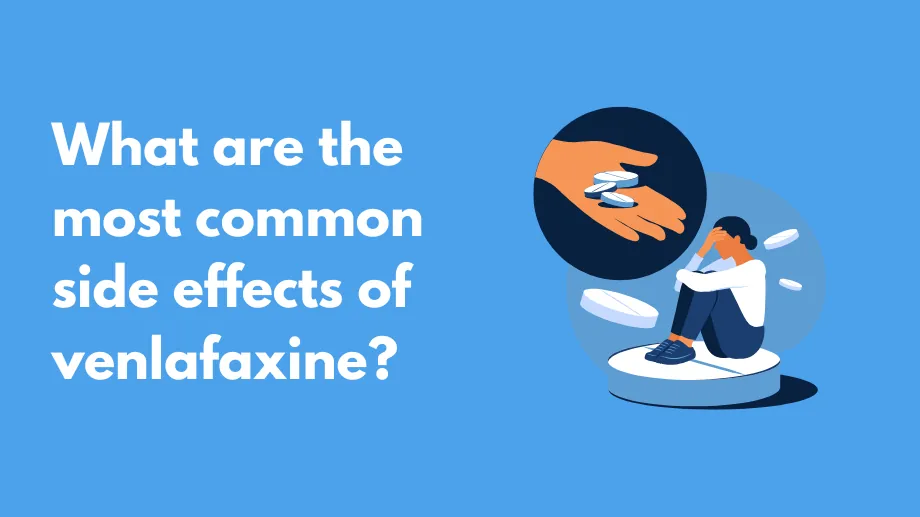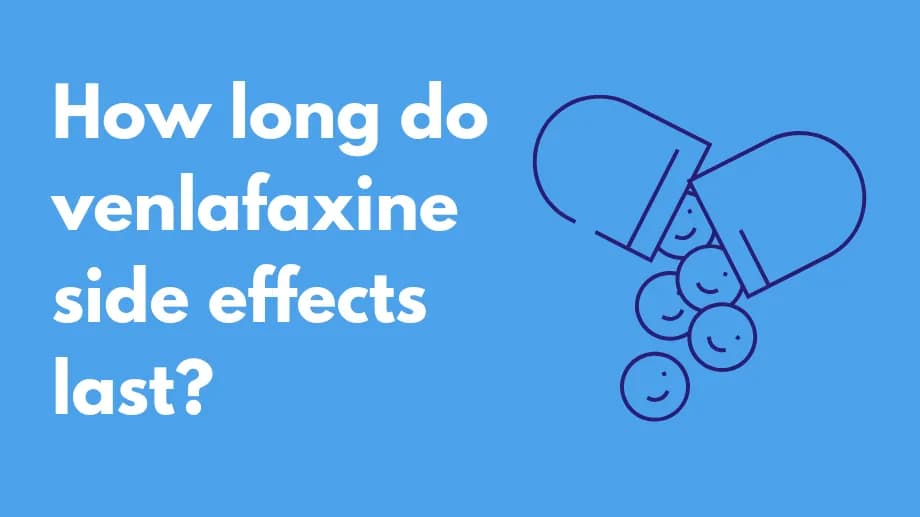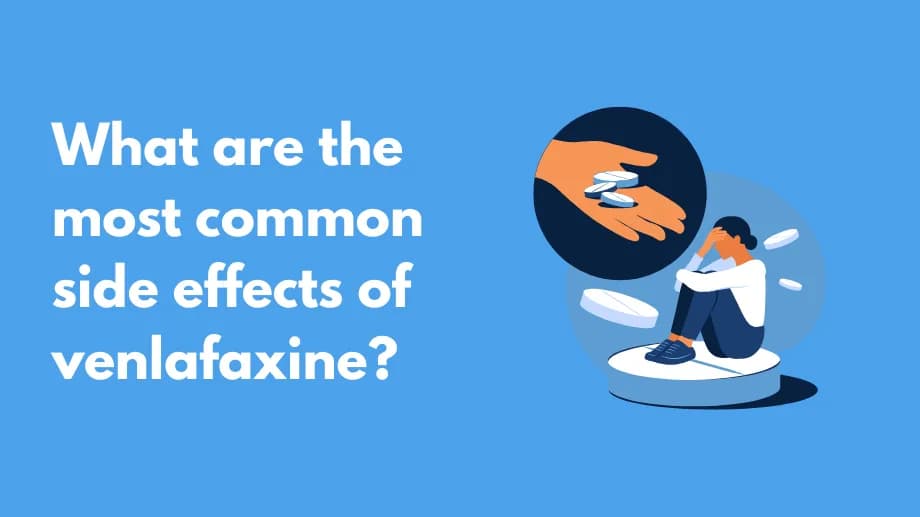What are the most common side effects of venlafaxine?

Venlafaxine is FDA-approved to treat mood disorders like depression and anxiety. Because it is effective and generally well-tolerated, venlafaxine is often one of the first antidepressants healthcare providers will prescribe.
As with all medications, though, venlafaxine carries the risk of side effects. Most are mild and will resolve as your body gets used to the medication. But others can be more serious. Some of the most common side effects from clinical trials include:
- Headache (25–38%)
- Nausea (21–58%)
- Trouble sleeping (15–24%)
- Weakness (16–20%)
- Dizziness (11–24%)
- Ejaculation disorder (2–19%)
- Sleepiness or drowsiness (12–26%)
- Dry mouth (12–22%)
- Sweating (7–19%)
- Loss of appetite (15–17%)
- Nervousness (17–26%)
- Constipation (9–15%)
- Delayed, infrequent or absent orgasms (5–13%)
Other less serious side effects of venlafaxine that have been reported include:
- Weight loss (1–6%)
- Vision changes such as blurred vision (4–6%)
- Hypertension (high blood pressure) (2–5%)
- Impotence (4–6%)
- Tingling or numbness (2–3%)
- Tremor (1–10%)
- Vomiting (3–8%)
- Weight gain (2%)
- Gas (3–4%)
- Itching (1%)
- Yawning (3–8%)
- Indigestion (5–7%)
- Twitching (1–3%)
- Dilated pupils (2%)
Most of these side effects will resolve on their own. However, if you experience any side effects that are bothersome or worsen, call your healthcare provider right away. Do not stop taking venlafaxine or change your dose without talking to them first.
Venlafaxine FAQs
What are the serious side effects of venlafaxine?
Rarely, venlafaxine may cause some more serious side effects such as:
- Serious allergic reactions with symptoms such as:
- Hives
- Swelling of your face, tongue, or throat
- Shortness of breath
- Increased risk of suicidal thoughts and behaviors. Notify your healthcare provider right away if you have new or worsening depression, suicidal thoughts, or behavior, especially during the first few months of treatment or when your dose is changed.
- Serotonin syndrome, especially if taken with other medications that increase serotonin levels in your brain. Symptoms include fast heart rate, sweating, muscle stiffness, fever, and confusion. Seek immediate medical attention if you experience these symptoms.
- A sudden decrease in blood pressure and fainting. Let your healthcare provider know if you experience dizziness often while on venlafaxine.
- Increased risk of bleeding. Notify your healthcare provider if you have bruising that does not go away, black-colored stools, pink or red urine, unusual nosebleeds, or bleeding from your gums.
- Manic episodes if you take venlafaxine and have bipolar disorder. Talk to your healthcare provider right away if you notice unusual changes in your behavior.
- Eye problems such as angle-closure glaucoma. You should have an eye exam before starting venlafaxine. Call your healthcare provider if you have eye pain, redness, swelling, dilated pupils, or vision changes such as seeing rainbows around lights at night.
- Low sodium levels with symptoms that include:
- Confusion
- Headache
- Dizziness and fainting
- Seizures
- Coma
- Lung problems. Notify your healthcare provider right away if you have shortness of breath, a cough that does not go away, or chest pain.
- Withdrawal symptoms with sudden discontinuation of venlafaxine, including:
- Agitation
- Anxiety
- Tiredness
- Confusion
- Mood changes
- Dizziness
- Headache
- Diarrhea
- Seizures
These are not all of the possible side effects of venlafaxine. Contact your healthcare professional for medical advice about any possible adverse effects you experience while taking this medication. You can report your adverse effects to the FDA at 1-800-FDA-1088 or www.fda.gov/medwatch.
What is venlafaxine used for?
Venlafaxine is approved by the U.S. Food and Drug Administration (FDA) to treat adults with:
- Major depressive disorder (MDD)
- Generalized anxiety disorder (GAD)
- Social anxiety disorder (SAD)
- Panic disorder (PD)
Venlafaxine is also used off-label to treat diabetic neuropathy, attention-deficit/hyperactivity disorder (ADHD), hot flashes, fibromyalgia, post-traumatic stress disorder (PTSD), obsessive-compulsive disorder (OCD), and migraine prevention.
What is the mechanism of action for venlafaxine?
Venlafaxine hydrochloride is the active ingredient in brand-name Effexor and the extended-release capsule Effexor XR. It belongs to the drug class called serotonin‑norepinephrine reuptake inhibitors (SNRIs). It works by increasing the serotonin and norepinephrine levels in your brain. This is thought to help improve your mood and relieve symptoms of depression.
What drug interactions are there with venlafaxine?
When venlafaxine is taken with other drugs, it can change how they work or make some side effects more likely or severe. You should ask your healthcare provider if any of the prescription medications, over-the-counter drugs, vitamins, or supplements you take may interact with venlafaxine, including:
- Monoamine oxidase inhibitors (MAOIs) such as isocarboxazid, linezolid, methylene blue, phenelzine, tranylcypromine, and selegiline
- Selective serotonin reuptake inhibitors (SSRIs) such as escitalopram, citalopram, sertraline, and fluoxetine
- Nonsteroidal anti-inflammatory drugs (NSAIDs) such as naproxen, aspirin, and ibuprofen
- Blood thinners like warfarin
- St. John’s wort
- Lithium
- Tramadol
- L‑tryptophan
- Amphetamines (venlafaxine may cause false positive test results)
Are there any contraindications for venlafaxine?
Venlafaxine should not be taken if you have an allergy to venlafaxine, desvenlafaxine, or any inactive ingredients in the product. You should also avoid venlafaxine if you have taken a monoamine oxidase inhibitor (MAOI) in the last 14 days.
What should you tell your healthcare provider before starting venlafaxine?
Your healthcare provider should know any other medical conditions you have before starting venlafaxine, such as:
- Family history of depression, suicide, mania, hypomania, or bipolar disorder
- High blood pressure or other heart problems
- Bleeding problems
- Angle-closure glaucoma
- High cholesterol or high triglycerides
- Kidney or liver disease
- History of seizures
- Low sodium levels
- Lung disease
- Alcohol use
- Pregnancy or plans to become pregnant (venlafaxine may harm your unborn baby)
- Breastfeeding or plans to breastfeed (venlafaxine may pass into your breast milk and harm your infant)
What happens if you miss a dose of venlafaxine?
You should not miss a dose of venlafaxine. Missing too many doses or suddenly stopping this medication can cause serious side effects such as:
- Dizziness
- Anxiety, agitation, and irritability
- Seizures
- Ringing in your ears
- Insomnia
- Nausea
- Extreme fatigue
- Confusion
- Headache
- Diarrhea
- Mood changes
If you miss a dose of venlafaxine, take it as soon as you remember. If it is near the time of the next dose, skip the missed dose and take your next dose at its regular time. Do not double the dose to catch up.
Can you drink alcohol while on venlafaxine?
Technically, you can drink alcohol while taking venlafaxine, but they each have side effects, and these can worsen when you combine them. This can include confusion, reduced reaction time, dizziness, and drowsiness. Alcohol can also cause erectile dysfunction, and venlafaxine has sexual dysfunction side effects, including erectile dysfunction.
Drinking alcohol while on venlafaxine may also increase your risk of more serious complications. Alcohol can decrease venlafaxine’s effectiveness in treating your symptoms, potentially worsening your mental health. You may experience worsening anxiety, paranoia, sadness, and extreme mood swings. Because alcohol and venlafaxine are both metabolized by your liver, you increase your risk of liver damage when you combine the two. This combination may also make you more likely to have heart-related problems and an increased risk of bleeding.
If you are prescribed venlafaxine, tell your healthcare provider about your typical alcohol consumption. They may make recommendations on how much alcohol you can drink based on your physical and mental health history.
Is venlafaxine hard on your heart?
It is possible that venlafaxine may raise your blood pressure, especially if you take more than 300 mg per day. It is also possible that this can occur at lower doses.
You and your healthcare provider should regularly check your blood pressure while on venlafaxine. If you notice signs of high blood pressure, like frequent headaches, be sure to let them know right away. Your healthcare provider may need to lower your venlafaxine dose or change your medication.
What should you not take with venlafaxine?
Venlafaxine should not be taken with monoamine oxidase inhibitors (MAOIs) or started if you have taken one within the last 14 days. This is because they can increase your risk of serotonin syndrome. Be sure your healthcare provider knows if you have taken an MAOI such as isocarboxazid, phenelzine, tranylcypromine, selegiline, linezolid, or intravenous methylene blue in the last two weeks.
Related Medications
- Pristiq (desvenlafaxine ER)
- Cymbalta (duloxetine)
- Savella (milnacipran)
- Fetzima ER (levomilnacipran ER)


